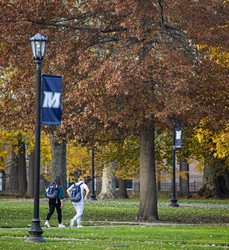An email was sent from the Student Employment Office to all federal work-study students about available jobs on campus and one student accidentally clicked “Reply All,” which started a chain of emails to all federal work-study students on Nov. 12.
Someone kindly responded to the student who accidentally clicked “Reply All” that she made a mistake. From there the emails took off. This accident caused a thread of over 140 emails.
The recipients of this email thread included all federal work-study students, which, according to Aimee Parks, Assistant Director of Human Resources for Student Employees, includes approximately 1,800 students. Parks says that in her 15 years working at Monmouth, she has never had an instance such as this.
“In general, reply all is dangerous when you don’t know who the addresses are. Especially if you don’t know when that address is an alias for thousands, even hundreds of thousands of people,” said Dr. Edward Christensen, Vice President of Information Management.
The email responses after the initial reply varied from people trying to be comedians to people looking for something to do or trying to gain followers on social media. At one point students received over 100 emails within one hour.
Students trying to do homework or expecting important emails from possible employers, professor, etc. were very annoyed by this long chain. Cassie Hellwig, a social work student, held some of the same sentiments about the situation, “It’s immature to spam everyone on campus with over 100 emails. Because of this incident some of us can’t even read or access our important emails.”
Hayley Bray, a health studies student, said of the nature of the emails, “I personally just think as college students it was a very immature way to approach the situation. What got me mad was how someone made a mistake and instead of letting it go like they should have done, they made it into a big joke.”
As for the content of the emails, Bray says, “The things said in that email we’re highly inappropriate and so unprofessional. I expected to see more from Monmouth University students and it made me embarrassed even though I did not even respond, it was very childish.”
Some University students were very upset with what was said in the email thread. Ranging from profanities to inappropriate pictures, content, and gifs, Bray said.
Hellwig further explains, “We, as students, utilize our emails as a means to better our education with communicating things that are happening on campus, as well as a way to reach out to classmates and professors. So, when students spam everyone’s mailbox campus wide they are also disadvantaging themselves.”
Moving forward, students can learn from this mistake. Parks says of the dangers of the “Reply All” option, “If an office is e-mailing students, correspondence should be professional. I’m sorry if responses got out of hand. Responses are not anonymous. Be careful.” Parks further says, “I wish that students could be respectful to one another. Would they e-mail some of these statements to their parents? Professors? Bosses?”
Monmouth’s technological response to this issue has been an added level of security to larger mailing groups in order to prevent this from happening again in the future. “We moved it to a different technology that we use for distribution; no longer can anyone reply to an email in that way,” said Christensen. He also advised students to think more about what they put in an email thread because they are not anonymous.
photo Taken by Lauren Niesz



